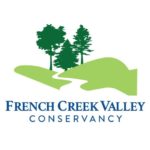Your Land is a Vital Link
Conserving land for future generations is the ultimate legacy. Conserved land filters our water, cleans our air, protects our open space, and provides a source of sustainable local products that support our local economy. As a land trust, we can help you meet your individual goals for conserving your property in the best possible way. Click the links at left to learn more about your options.
To date, the French Creek Valley Conservancy and its partners have conserved approximately 6,000 acres in the French Creek Watershed that will be protected forever for future generations to enjoy.
What Does Protected Mean?
“Protected” means protected from development. Land that is owned by a land trust remains open to the public for recreational purposes including hiking, fishing, hunting, bird watching, and more. Landowners may also donate land with specific intentions such as creating a wildlife refuge, which may limit some uses according to the landowner’s goals. Land that is placed in a conservation easement may or may not be open to public use, depending on the landowner’s goals and desires.
Land Conservation Has Economic Benefits
Donating land or conservation easements to a land trust for conservation purposes is truly a great legacy to leave for future generations. But, it may also provide significant financial advantages including:
Federal income tax deductions
Reduced real-estate taxes while holding re-sale value
Reduced estate taxes
What are my Options?
Landowners wishing to conserve their land in perpetuity have many options and our land protection specialist can work with you to choose the best option for fitting your goals.
Some of these options include:
Fee lands are lands that have been donated to a land trust or purchased by a land trust for permanent conservation. These lands are cared for by the land trust and protected forever. Landowners who donate their land to a land trust are entitled to an income tax deduction for the value of the property.
Conservation easements are another option for landowners who wish to permanently protect their land but also want to retain control and ownership of the property. Easements are an agreement between a landowner and a land trust that limits certain uses on all or part of a property. Each agreement is tailored to the goals of the individual landowner and the land trust. For example, an easement agreement may allow sustainable forestry on the property, but limit other practices. Another example would allow farming on a property, but forbid development. Depending on the circumstance, donation of a conservation easement can also have tax benefits for the landowner.
Hear from some who have conserved their land
Thinking about your options for conserving the land that you love? Watch two testimonials from landowners in the French Creek Watershed who have protected their property in perpetuity.


